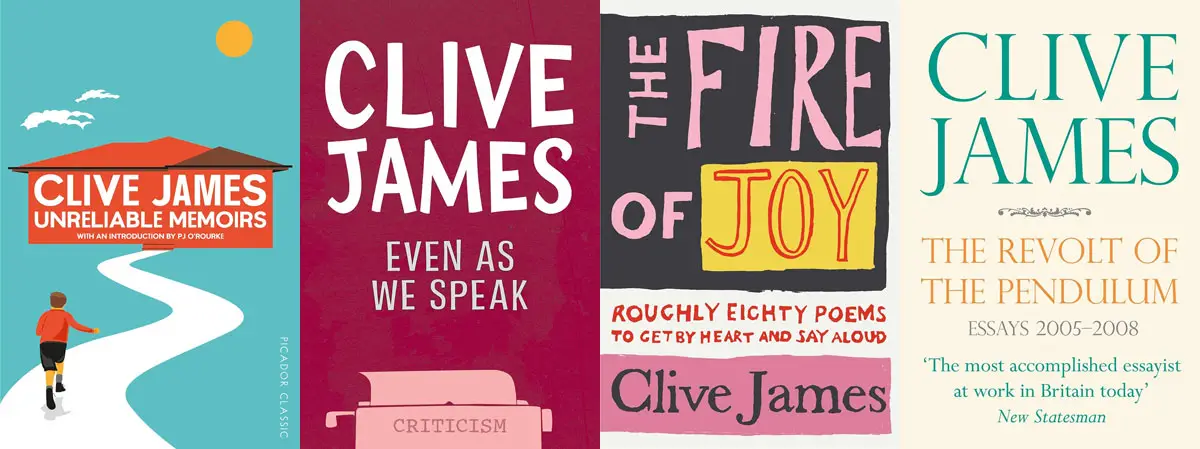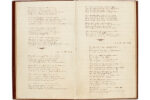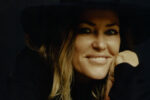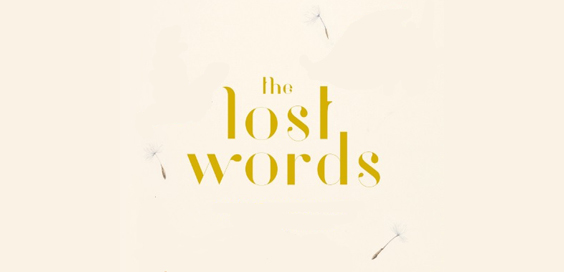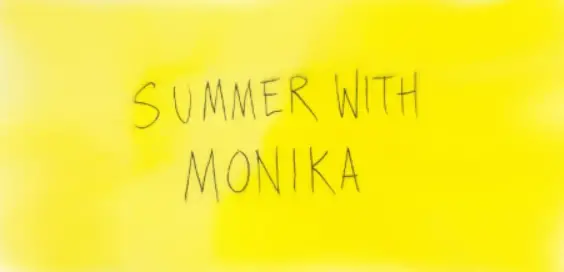An Interview with Clive James
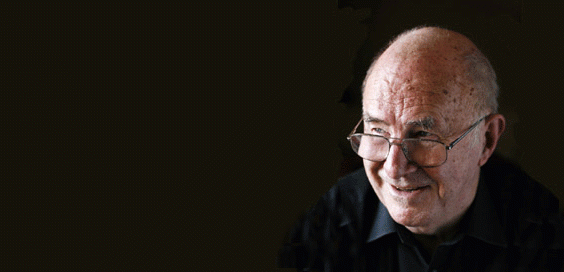
Appetite for Discussion
by Matt Callard
Someone is being bombarded. There are bleeps and buzzes, snatches of sound and dialogue – at one point I can make out a familiarly nasal Australian tone discussing, I think, Celine.
It’s either a Blue Jam-style sound montage, a particularly out-there electro jazz ensemble or Clive James has pressed the wrong button on his computer.
“Don’t worry, I won’t charge you for this time,” he says, “but I’ve just pressed the wrong button on my computer.”
Even an honorary doctorate, author, critic, poet, broadcaster, raconteur, wit, polyglot, soon-to-be playwright and all-round intellectual of world-renown can sometimes hit F5 instead of 5.
So Clive is fiddling with his website – a remarkable resource indeed – that started out as an archive of the Australian’s own work (‘not a very charming idea, even when the pharaohs did it’) but quickly developed into a fascinating document of the things he likes, the people he speaks to and the places he has seen – ‘the ideal form of self-expression’ he claims.
“An archive of my own work”
So amid his always-engrossing home-filmed discussions with the likes of Cate Blanchett and Stephen Fry you’ll find snippets of video art, poetry, sculpture and comic books. And if serious discussion is your thing you can dive into a full half hour of Martin Amis, Germaine Greer or Salman Rushdie swapping intellectual uppercuts with Clive. It’s the kind of thrilling discussion that makes for prime time TV on the continent and for which there is a genuine appetite in this country. An antidote to the stale party-speak of most of our political debate. Yet it’s seldom heard away from Radio 4’s dusty netherworld.
“It’s coming on, it’s coming on,” he states humbly. “It has taken several years to build it. All of five years to get it where it is and it’s just starting to happen. Unashamedly it started off as an archive of my own work but then I realised it could be a lot more interesting than that. I could put other things on it. It could lead to various places and it could be a sort of point of call to people all over the world who wanted to branch out into other subjects. So, for example, someone who logs on in Nicaragua to find out about something that somebody wrote, might discover in the video section that there’s a music video of an opera and they’ve never even seen an opera – that sort of thing.”
“You can die of success overnight”
It’s an ever-growing resource – but it doesn’t come cheap – a problem Clive is slowly getting round to solving. “You can do things on the web comparatively cheaply, although it does cost some money – the pricey bit of the website is the interviews. There’s the cost of production and transmission. The awkward trick of web casting is you pay more, the more people log on. You can die of success overnight. I have to lay all those costs off – it takes a bit of juggling but I’m working on it. The trouble with doing it with a partner – Times Online, Sky TV and so on – you can’t blame them for wanting good billing and for wanting me to talk to recognisable stars – but I like to talk to some unrecognisable people too.”
Clive himself is, of course, still most widely-recognised for his TV work: Clive James on TV and his much-loved Postcard From… travel series. Although he pretty much quit TV work in 2000. “It’s not that I didn’t love television – I did love it. I’m grateful to it, but I’d done enough by the year 2000. I don’t think there’s a place for me. Quite often I get asked to do various things. I don’t belong on there anymore because I would be asked to comment on reality TV and I’m just not interested in reality TV. I don’t pop up on TV just for the sake of being there.”
“Two men warring within one body”
TV’s loss has been the stage’s gain. His monumentally vast stand-up tour, Clive James in the Evening has been on the road for almost two years. It’s a medium he loves. Indeed, a medium he confesses to something of an addiction to. “I love going on stage and talking for an hour and a half. I find it utterly engrossing and relaxing. Mustn’t get too relaxed of course – you don’t want to go to sleep up there. It’s still quite daunting – there are a lot of people to please – sometimes there are a thousand of them.”
Nightly, Clive even takes the daring step of throwing himself open to audience questions. “Yeah, well that’s the really unpredictable bit. Of course there’s the occasional nutter with a propeller on his flying helmet, but most of the questions are terrific – even the crazy ones you can turn into something.”
It’s always been a contrary passion – he admits to being a typically reclusive writer (“I like to sit at my desk and fiddle with my website”) – but finds the pull of the stage strangely irresistible. “The two men are warring within the one body,” he confesses. But it’s that crucial audience bond that the stand-up craves; “Especially after 20-years in television, because you don’t have an audience. Sometimes there’s a studio audience but the audience that counts is the one at the other end of the glass tube and you don’t see them, even though there are millions of them.”
“I’ve got a lot more to say”
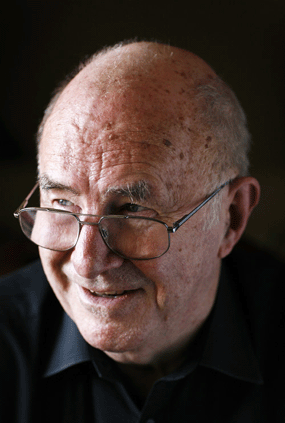 Clive James may have retired from TV but there’s been little sign of the 70-year old slowing down. A still-prolific poet, writer and essayist (a second volume of his huge and brilliant critical observations, Cultural Amnesia is promised) he is, seemingly, grafting harder than ever.
Clive James may have retired from TV but there’s been little sign of the 70-year old slowing down. A still-prolific poet, writer and essayist (a second volume of his huge and brilliant critical observations, Cultural Amnesia is promised) he is, seemingly, grafting harder than ever.
“Retirement is killing me, as somebody once said. I’ll have to retire from my retirement. But that’s one of the reasons I left mainstream television – there were other things I wanted to do. Mainstream television is very demanding – it takes a week in the office to get one hour on the air. To make room for this sort of thing I simply had to walk away. But I’ve published three books this year, so something must be going right. I’ve got a lot more to say.”
He snaps out that last line – grits it through his teeth. Clive James, it seems, has plenty of unfinished business. “I think I’ve climbed the mountains, but guess what you see when you get to the top of the mountain – you see more mountains. And then time runs out. I’d like to write a play – everybody would, I think. I’m not sure what kind of play it’s going to be but I’m looking forward to it. I’ve come to it quite late, but old is the new young, so I’ll do the old man’s version of the young man’s play.”
“I have great respect for the tango”
You get through so much in half an hour of Clive James’s company that I almost forget to do my duty as a Yorkshireman – and goad him about The Ashes. But he skilfully sidesteps the provocation: “I back both sides. I am pleased the Poms won because it evened things out a bit. Keeps the Australians on their toes. Australia and England are much more level today in terms of sporting achievement. Now they’ve got one tennis player each.”
He flirts enticingly with other subjects. I ask, with my tongue in my cheek, whether Clive would consider a stab at Strictly Come Dancing. It turns out he has a room in his flat ready-made for the tango. He has been known to fly to Argentina for lessons! “I got asked to do Strictly Come Dancing, or do the tango. But I have great respect for the tango. My respect for the tango is higher, shall I say, than John Sergeant’s respect for the paso doble. I wouldn’t put myself in that position – I wouldn’t be as funny as he was.”
He can take up any thread of conversation with glee and underscore it with an anecdote, a flash of wit, a word of wisdom.
But we haven’t got all day. As the man said: “You see more mountains. And then time runs out.”
Editor’s note: This archived interview is from 2009. Clive James died in 2019, aged 80.
